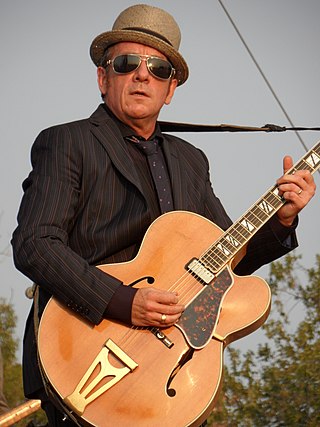
Declan Patrick MacManus, known professionally as Elvis Costello, is an English singer, songwriter, record producer, author and television presenter. According to Rolling Stone, Costello "reinvigorated the literate, lyrical traditions of Bob Dylan and Van Morrison with the raw energy and sass that were principal ethics of punk", noting the "construction of his songs, which set densely layered wordplay in an ever-expanding repertoire of styles." His first album, My Aim Is True (1977), is widely regarded as one of the best debuts in popular music history. It spawned no hit singles, but contains some of Costello's best-known songs, including the ballad "Alison". Costello's next two albums, This Year's Model (1978) and Armed Forces (1979), recorded with his backing band the Attractions, helped define the new wave genre. From late 1977 until early 1980, each of the eight singles he released reached the UK Top 30. His biggest hit single, "Oliver's Army" (1979), sold more than 500,000 copies in Britain. He has had more modest commercial success in the US, but has earned much critical praise. From 1977 until the early 2000s, Costello's albums regularly ranked high on the Village Voice Pazz & Jop critics' poll, with This Year's Model and Imperial Bedroom (1982) voted the best album of their respective years. His biggest US hit single, "Veronica" (1989), reached number 19 on the Billboard Hot 100.

Almost Blue is the sixth studio album by the English singer-songwriter Elvis Costello, and his fifth with the Attractions—keyboardist Steve Nieve, bassist Bruce Thomas and drummer Pete Thomas. It was recorded in May 1981 in Nashville, Tennessee, and released in October the same year. A departure from Costello's previous works, it is a covers album composed entirely of country music songs, including works written by Hank Williams and George Jones. The project originated with Costello's desire to record a collection of covers after his two previous studio albums commercially underperformed following Armed Forces (1979).

My Aim Is True is the debut studio album by the English singer-songwriter Elvis Costello, originally released in the United Kingdom on 22 July 1977 through Stiff Records. Produced by Stiff artist and musician Nick Lowe, the album was recorded from late 1976 to early 1977 over six four-hour studio sessions at Pathway Studios in Islington, London. The backing band was the California-based country rock act Clover, who were uncredited on the original release due to contractual difficulties. At the time performing as D.P. Costello, Costello changed his name to Elvis after Elvis Presley at the suggestion of the label, and adjusted his image to match the rising punk rock movement.

Freak Out! is the debut studio album by the American rock band the Mothers of Invention, released on June 27, 1966, by Verve Records. Often cited as one of rock music's first concept albums, it is a satirical expression of guitarist/bandleader Frank Zappa's perception of American pop culture and the nascent freak scene of Los Angeles. It was the second rock music double album ever released, following Bob Dylan's Blonde on Blonde just one week earlier, as well as the first double debut album by a rock artist. In the UK, the album was originally released as an edited single disc.
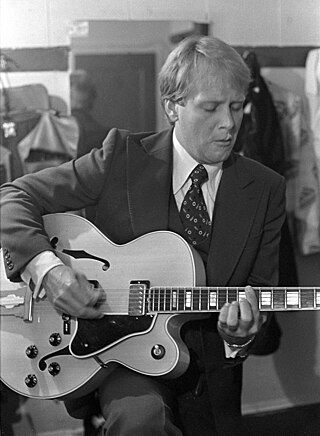
Martin Eugene Mull was an American comic actor whose career included contributions as a musician and painter. He became known on Mary Hartman, Mary Hartman, its spin-off Fernwood 2 Night, and America 2 Night. Other notable roles included Colonel Mustard in the 1985 film Clue, Leon Carp on Roseanne, Willard Kraft on Sabrina the Teenage Witch, Vlad Masters / Vlad Plasmius on Danny Phantom, and Gene Parmesan on Arrested Development. He had a recurring role on Two and a Half Men as Russell, a drug-using, humorous pharmacist.

Punch the Clock is the eighth studio album by the English singer-songwriter Elvis Costello, and his seventh with the Attractions—keyboardist Steve Nieve, bassist Bruce Thomas and drummer Pete Thomas. It was released on 5 August 1983 through F-Beat Records in the United Kingdom and Columbia Records in the United States. Produced by Clive Langer and Alan Winstanley, the album was Costello's attempt at making a commercial record following years of dwindling commercial success. It was recorded at London's AIR Studios in early 1983 and features contributions from the TKO Horns and Afrodiziak.
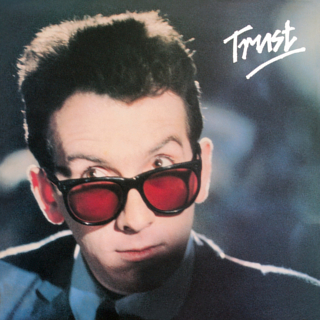
Trust is the fifth studio album by the English singer-songwriter Elvis Costello, and his fourth with the Attractions—keyboardist Steve Nieve, bassist Bruce Thomas and drummer Pete Thomas. It was released on 23 January 1981 through F-Beat Records in the United Kingdom. Produced by Nick Lowe, with assistance by the engineer Roger Béchirian, the album was recorded in London from October to November 1980 between DJM and Eden Studios. The sessions were riddled with alcohol and drug issues and tensions were high between the band members. Squeeze's vocalist Glenn Tilbrook and the Rumour's guitarist Martin Belmont made guest appearances on "From a Whisper to a Scream".

John Watson Jr., often known professionally as Johnny "Guitar" Watson, was an American musician. A flamboyant showman and electric guitarist in the style of T-Bone Walker, his recording career spanned 40 years, and encompassed rhythm and blues, funk and soul music.
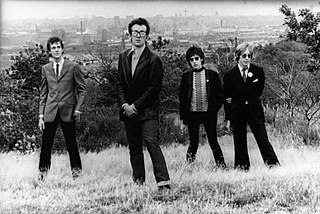
The Attractions were an English backing band for the English new wave musician Elvis Costello between 1977 and 1986, and again from 1994 to 1996. They consisted of Steve Nieve (keyboards), Bruce Thomas, and Pete Thomas (drums). They also released one album as an independent entity, without Costello, in 1980.
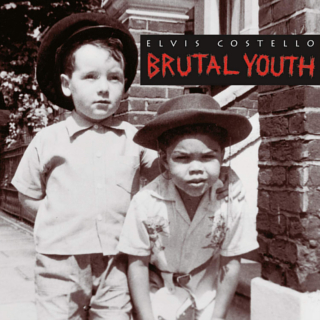
Brutal Youth is an album by English musician Elvis Costello, released in 1994. It contains the first recordings Costello made with his band the Attractions since Blood and Chocolate (1986). Brutal Youth was the third, and most recent of Costello's albums, to peak at number two in the UK Albums Chart, following on from Armed Forces (1979) and Get Happy!! (1980).

Heatwave was a rock festival held on August 23, 1980 at Mosport Park north of Bowmanville, Ontario, Canada. The slogans used to promote the show were variously the "Punk Woodstock", the "New Wave Woodstock", or "The 1980s Big Beat Rock and Roll Party". The festival was noteworthy because of the importance of the headliner bands that played and the timing in the evolution of new wave music, and the size of the crowd.

"Pump It Up" is a 1978 song by Elvis Costello and the Attractions. It originally appeared on Costello's second album This Year's Model, which was the first he recorded with the backing group the Attractions. Written as an ironic response to his time during the Stiffs Live Tour and inspired by "Subterranean Homesick Blues" by Bob Dylan, "Pump It Up" features a stomping rhythm and ironic lyrics.

"I Can't Stand Up for Falling Down" is a song written by Homer Banks and Allen Jones. Originally recorded by soul duo Sam & Dave in 1967, the song was famously covered by new wave musician Elvis Costello with his backing band the Attractions in 1980 for their album Get Happy!!.

"Man Out of Time" is a song written by new wave musician Elvis Costello and performed by Elvis Costello and the Attractions on their 1982 album, Imperial Bedroom. With lyrics detailing a political scandal, "Man Out of Time" features a lush arrangement that was a conscious departure from the aggressive style of Costello's previous work.

"Girls Talk" is a new wave song written by Elvis Costello and first recorded by Dave Edmunds in 1978. Costello gave an early version of the song to Edmunds, who reworked the song and released it on his album Repeat When Necessary. Edmunds' version peaked at number four on the UK Singles Chart and number 12 in Ireland, becoming one of Edmunds' most successful career singles.

"(I Don't Want to Go to) Chelsea" is a song written by new wave musician Elvis Costello and recorded by Costello with his backing band the Attractions. The song appeared on Costello's 1978 second album, This Year's Model. Written by Costello while working as a computer programmer, the song was lyrically inspired by films Costello had been watching as well as childhood trips to Chelsea. Musically the song featured influence from bands such as the Who and the Kinks and is notable for Bruce Thomas's prominent bassline.

"High Fidelity" is a song written and performed by new wave musician Elvis Costello on his 1980 album, Get Happy!! Written about an adulterous couple where one member still hopes for reconciliation, "High Fidelity" reflected the personal struggles that Costello had been suffering at the time as a result of increased fame and controversy. Musically, the song was influenced by Motown and was initially performed in a slower style inspired by David Bowie's Station to Station.

"I Want You" is a song written by Elvis Costello and recorded with his backing band the Attractions. It was released on his 1986 album Blood & Chocolate.
Tris McCall is a music journalist, novelist, and rock musician from Hudson County, New Jersey, described by The New York Times as "the plugged-in, Internet-era muse of Jersey City." In 2010, he became the music critic for the Newark Star-Ledger. As of 2017, McCall has released four solo albums; songs intended for two future albums are previewed alongside his short stories in a web project called McCall's Almanac.
The Computers are a British rock band from Exeter, England. Their sound initially fused hardcore punk and garage rock and progressed to a less heavy sound incorporating blues and soul. As of 2023, The Computers have released one mini-album and three albums, This Is the Computers (2011), Love Triangles Hate Squares (2013) which registered 70 and 75 points, respectively, on the Metacritic rating scale and Birth/Death (2016).


















